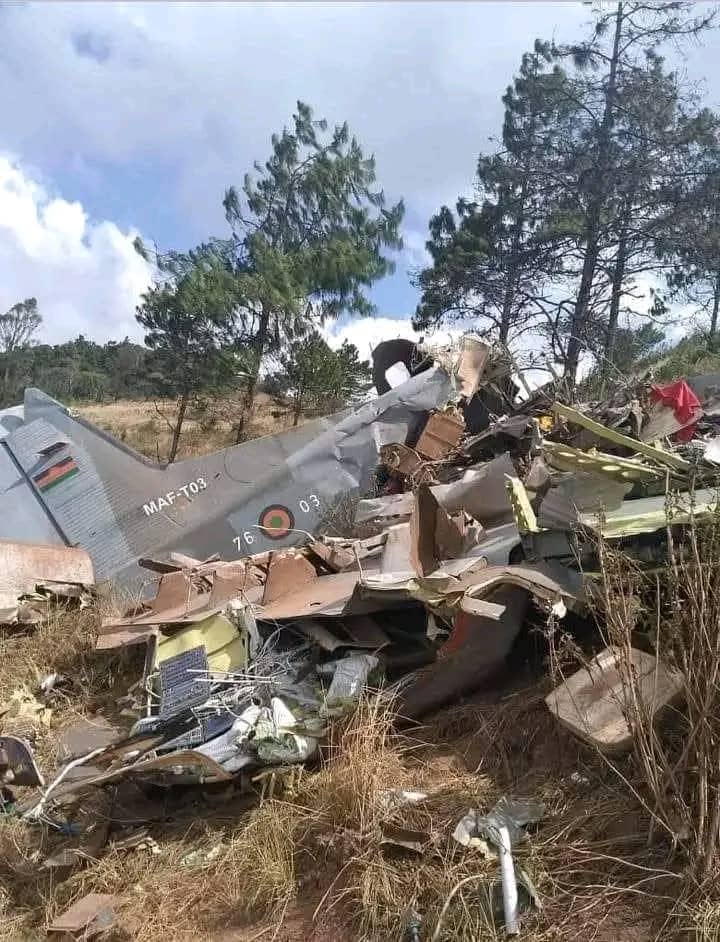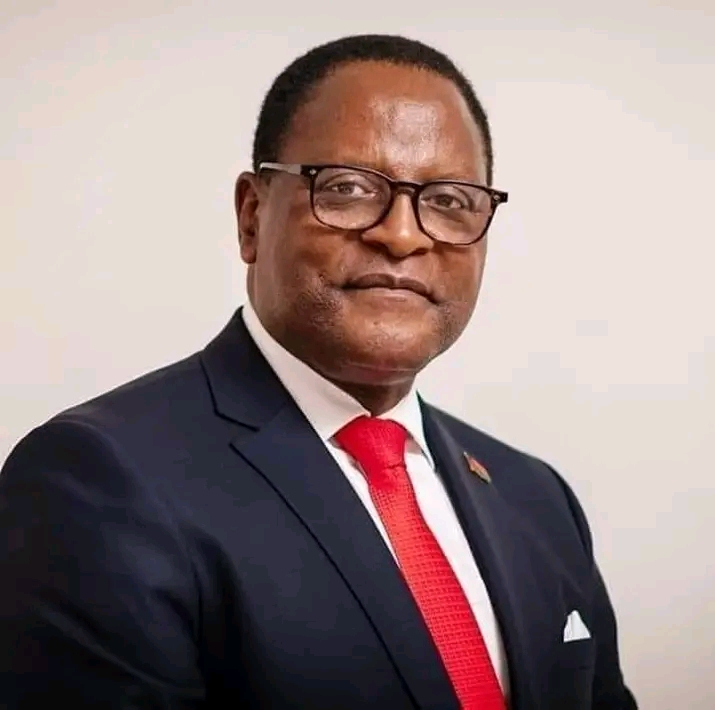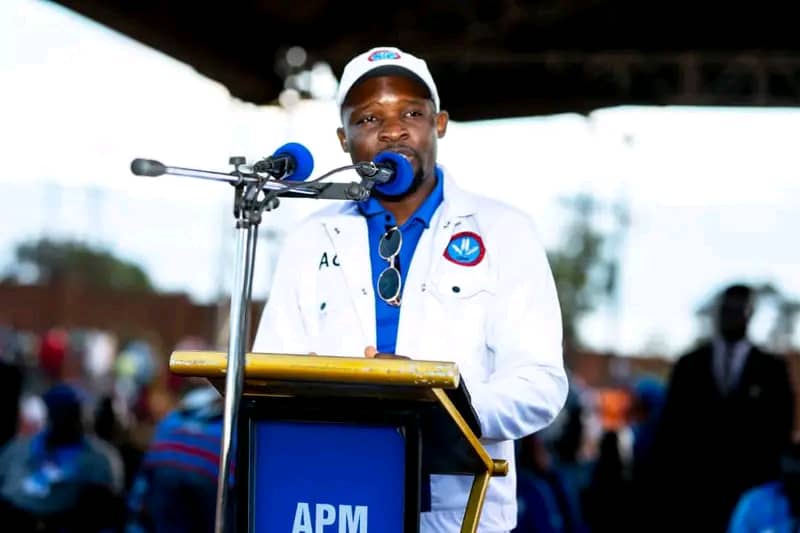By Burnett Munthali
Welcome and introduction to the interview
Hello Rick, and thank you for joining us today. We are honored to have you here to discuss the tragic plane crash involving Vice President Saulos Chilima and the subsequent Commission of Inquiry report. Your insights as a respected social commentator will be invaluable in shedding light on the broader implications of this incident for Malawi’s political landscape, public safety, and accountability.
As you know, this tragic event has raised several important questions about the cause of the crash, the government’s response, and the impact on public trust in our national institutions. Today, we aim to explore your perspective on these issues and get a deeper understanding of the lessons we can learn moving forward.
Rick Dzida (RD): I appreciate your initiative of conducting exclusive Interviews with me. My aim is to provide the audience with an objective critical analysis of the situation at hand. Let me take this opportunity to thank my readership for their support and constructive criticisms. Such comments provide me with different perspectives.
Let’s begin with your thoughts on the crash and the initial reactions to the Commission of Inquiry’s findings.
Questions
1) How did you personally react to the tragic plane crash involving Vice President Saulos Chilima? What was your initial assessment of the situation?
RD: Upon learning Chilima’s missing plane, I candidly experienced the widely accepted five general phases of grief formulated by Kübler-Ross which are denial, anger, bargaining, depression and acceptance.
In fact, when I heard in the social media platforms that Chilima’s plane was missing, I didn’t take it seriously. I was in the denial phase.
When Babu Khamisa posted the message in the WhatsApp group from Collen Zamba, Secretary to the office of President and Cabinet, (OPC) confirming the missing plane, I drifted into the anger stage. I asked myself in shock, “Why Chilima?”.
I then started bargaining with myself hoping that the plane could have landed somewhere. Or if it crashed, perhaps he could be one of the survivors.
When the search operation was delayed and later suspended, I became disappointed and depressed. Suffice to say that I personally knew Saulos Chilima when we were together at Chancellor College in the 90’s.
By the time the official announcement of his demise was effected, I had already accepted the situation. It was really horrendous.
Here was my initial assessment of the situation. When the search operation for the missing plane was delayed and later suspended the whole night for the next day, the statement from the longest serving American president, Franklin Delano Roosevelt (FDR) triggered in my mind.
FDR said, “In politics, nothing happens by accident. If it happens, you can bet it was planned that way”.
2) What do you think were the key findings from the Commission of Inquiry into the plane crash, and how do they impact public confidence in the safety of government officials?
RD : Here were the key findings from the Commission of Inquiry into the plane crash
The weather on the day of the accident was extremely bad, with heavy rainfall and strong winds.
The pilots were disoriented due to the bad weather conditions, leading to the accident.
The inquiry highlighted the need for improved safety measures to prevent such tragedies in the future.
These findings may impact public confidence in the safety of government officials in Malawi, as they raise concerns about the preparedness and safety protocols in place for government officials’ travel.
The fact that the accident was caused by a combination of human and environmental factors may lead to questions about the accountability of those responsible for ensuring the safety of government officials.
3) Do you believe the Commission of Inquiry’s report was thorough and transparent enough, or are there areas where you feel it fell short?
RD: Although some areas were objectively presented, the Commission overlooked and under-investigated other crucial and critical areas too
Areas where the report fell short
Some critics argue that the commission’s terms of reference were too narrow, focusing primarily on the immediate causes of the crash rather than broader systemic issues.
The commission’s report relied heavily on external experts, but some have questioned whether the commission had sufficient in-house technical expertise to thoroughly investigate the crash.
Some have raised concerns that the report did not adequately investigate the maintenance and airworthiness of the aircraft, which could have contributed to the crash.
While the report provided some level of transparency, some have criticized the commission for not releasing all relevant documentation and evidence, potentially limiting the public’s understanding of the crash.
Some critics have raised concerns about potential bias within the commission, which could have influenced the report’s findings and conclusions.
Areas where the report was thorough and transparent
The report provided a thorough analysis of the weather conditions on the day of the crash, which was a critical factor in the accident.
The Commission investigated the training and experience of the pilots, which helped to identify potential contributing factors to the crash.
The report provided actionable recommendations for improving aviation safety in Malawi, which could help prevent similar accidents in the future.
4) In your opinion, has the Commission’s inquiry provided sufficient answers to the public regarding the cause of the crash, or are there still questions left unanswered?
RD: While the Commission’s inquiry provided some answers, there are still questions left unanswered, and concerns about the investigation’s thoroughness and transparency.
Unanswered questions
Some have raised concerns that the commission didn’t adequately investigate the maintenance and airworthiness of the aircraft.
While the commission investigated the pilots’ training and experience, some have questioned whether this analysis was comprehensive enough.
There are still questions about the flight plan, including why the pilots deviated from the planned route.
The Commission’s report didn’t provide clear answers on the role of air traffic control in the crash.
Concerns about transparency and thoroughness
Some have raised concerns about potential bias within the commission, which could have influenced the report’s findings and conclusions.
The commission’s report was based on limited evidence, and some have questioned whether all relevant documentation and evidence were considered.
The commission’s methodology and investigative procedures have not been fully disclosed, raising concerns about the thoroughness of the investigation.
There are still calls for a more comprehensive and transparent investigation into the crash.
5) How do you view the government’s response to the findings of the Commission of Inquiry? Do you think it has been proactive or lacking in action?
RD: Based on publicly available information, here’s my assessment:
Government response
The government’s initial response to the death of officials in the plane crash was prompt, with the President declaring a period of national mourning.
The government established a Commission of Inquiry to investigate the crash, which was a positive step towards transparency and accountability.
The government received the Commission’s report and made it publicly available.
The government provided compensation to the families of the victims.
Lacking in action
The implementation of the Commission’s recommendations has been slow, with some measures still pending.
There have been concerns about the lack of transparency in the government’s response, including limited information on the crash investigation and the Commission’s findings.
There has been no clear accountability for the crash, with no individuals or organizations held responsible.
Some families of the victims have reported insufficient support from the government, including inadequate compensation and counseling services.
7) What measures should the government take to ensure the safety of high-profile figures, especially in light of the findings from the inquiry?
RD: To ensure the safety of high-profile figures in Malawi, especially after the Chilima plane crash inquiry, the government should implement robust security measures.
Regularly inspect and maintain aircraft to prevent mechanical failures.
Provide pilots with comprehensive training on navigating adverse weather conditions and emergency procedures.
Invest in modern air traffic control systems to improve communication and navigation.
Identify potential threats and vulnerabilities to high-profile figures .
Ensure that high-profile figures have armed escorts during travel and public appearances.
Use secure communication systems to prevent eavesdropping and cyber threats.
Bring together law enforcement agencies, intelligence services, and other stakeholders to share information and coordinate security efforts
Enhance information sharing between agencies to prevent security breaches and respond to threats effectively.
8) How important is it for the public to know the full truth about the plane crash and the events surrounding it, and why do you think transparency matters in such cases?
RD: Transparency is crucial in cases like the Chilima plane crash.
Why transparency matters
Transparency ensures that those responsible for the crash are held accountable, which helps prevent similar incidents in the future.
Transparency fosters trust and confidence in the government and institutions, demonstrating their commitment to openness and honesty.
Transparency provides closure for the families and loved ones of the victims, helping them understand the circumstances surrounding the crash.
Transparency allows for a thorough examination of the events leading up to the crash, enabling the implementation of improved safety measures to prevent similar incidents.
Transparency helps prevent speculation and rumors, which can be damaging to individuals and institutions.
Importance of knowing the full truth about Chilima’s plane
Knowing the full truth helps understand the causes of the crash, including any human error, technical issues, or systemic failures.
Transparency reveals any systemic issues or weaknesses that contributed to the crash, enabling corrective actions to be taken.
Knowing the full truth promotes learning and improvement, allowing institutions to adapt and implement changes to prevent similar incidents.
Consequences of lack of transparency
Lack of transparency can erode trust in institutions and the government, leading to widespread skepticism and mistrust.
Without transparency, speculation and rumors can spread, causing harm to individuals and institutions.
Lack of transparency can delay or prevent accountability, allowing those responsible to avoid consequences.
9) Do you think the investigation into the crash has been influenced by political factors, and if so, how?
RD: The investigation into Chilima’s plane crash has raised concerns about potential political influence.
President Chakwera’s decision to have the commission’s report presented to the public first has been questioned, with some arguing it’s a strategic move to gauge public reaction and potentially deflect backlash.
Critics suggest that the government may be attempting to control the narrative surrounding the crash, which could be seen as an effort to protect political interests.
The fact that President Chakwera is aware of the report’s contents but has chosen to present it to the public first has raised eyebrows, leading some to question the government’s commitment to transparency.
Furthermore, the Commission of Inquiry’s findings have highlighted the normalcy of the procedures surrounding the flight arrangements, which may imply that the government is trying to downplay any potential wrongdoing or negligence.
10) In your view, how should the Malawian public hold officials accountable for their actions and decisions, particularly when it comes to national security and safety?
RD: Holding officials accountable for their actions and decisions is crucial in ensuring transparency and good governance in Malawi, especially when it comes to national security and safety.
The public should push for transparency in government dealings, including budget allocations and expenditures, particularly in the security sector. This can be achieved through freedom of information laws and regular audits.
Institutions like parliamentary committees, ombudspersons, and anticorruption agencies should be empowered to investigate and hold officials accountable for any wrongdoing.
Whistleblowers should be protected and encouraged to come forward with information about corruption, abuse of power, or other forms of misconduct.
A free and independent media can play a crucial role in holding officials accountable. The public should support and engage with media outlets to raise awareness about issues and demand accountability.
The public should participate in public debates and discussions on national security and safety issues, demanding answers from officials and holding them accountable for their decisions.
Civil society organizations can provide a platform for the public to demand accountability and push for reforms. The public should support and engage with these organizations to amplify their voices.
By taking these steps, the Malawian public can demand accountability from officials and ensure that they are working in the best interests of the nation.
11) What lessons can be learned from this incident in terms of both political leadership and government accountability?
RD: The Chilima plane crash in Malawi offers valuable lessons for both political leadership and government accountability.
The government’s handling of the crash investigation has raised concerns about transparency and accountability.
The decision to present the commission’s report to the public before submitting it to the president has been seen as a positive step towards transparency .
However, the delay in releasing the report and the perception that the government may be trying to control the narrative have undermined trust in the government’s commitment to accountability .
The crash has highlighted the importance of effective leadership and communication in times of crisis.
President Chakwera’s emotional address during the funeral service was seen as a positive step, but his claims of ignorance about fraudulent projects and systemic inefficiencies added to the perception of a leadership disconnected from the people’s struggles.
The crash has also underscored the need for robust safety measures and risk management protocols.
The government must prioritize the safety of high-ranking officials and ensure that adequate measures are in place to prevent such tragedies in the future.
Ultimately, the Chilima plane crash has highlighted the need for governments to prioritize public trust and confidence.
The government must be transparent, accountable, and responsive to the needs and concerns of its citizens. By doing so, it can rebuild trust and confidence in its leadership and institutions.
12) How has the plane crash and the Commission’s report affected your view of Vice President Saulos Chilima’s leadership and role in government?
RD: The plane crash and the Commission’s report have significantly impacted the perception of Vice President Saulos Chilima’s leadership and role in government.
The tragedy has highlighted the importance of accountability and transparency in governance. Here are a few instances:
The report reveals that the use of the Dornier aircraft was a routine matter for the Office of the Vice President, and the procurement process followed standard protocols.
The report underscores the significance of the Vice President’s role in representing the government at national events, such as the funeral of Ralphael Kasambara.
The report highlights the government’s support for the Kasambara family, including a financial contribution of K5 million for funeral arrangements.
The Commission’s report has provided valuable insights into the events leading up to the plane crash. However, it has also raised questions about the government’s handling of the tragedy and the transparency of the investigation.
The tragedy has evoked widespread sympathy and respect for Chilima, who was seen as a dedicated public servant.
The report has raised questions about government accountability and transparency, which may impact the public’s trust in Chilima’s leadership and the government as a whole.
The tragedy has underscored Chilima’s legacy as a committed public servant, and his impact on Malawian politics will likely be remembered for years to come.
13) Do you believe that the findings of the inquiry will lead to any real changes in how government officials are protected or how such incidents are handled in the future?
RD: The findings of the inquiry surrounding Chilima’s death have the potential to lead to changes in how government officials are protected and how such incidents are handled in the future. However, the extent of these changes remains uncertain.
Positive Outcomes
The inquiry’s recommendations may lead to enhanced security protocols for government officials, including better risk assessment, more effective communication, and improved emergency response planning.
The inquiry’s findings may promote a culture of accountability within the government, encouraging officials to take responsibility for their actions and decisions.
The inquiry’s report may set a precedent for greater transparency in government investigations, allowing for more informed public debate and scrutiny.
Challenges and uncertainties
The government’s willingness and ability to implement the inquiry’s recommendations remain uncertain.
Entrenched interests and bureaucratic inertia may resist changes to existing protocols and procedures.
Malawi’s resource constraints may limit the government’s ability to invest in improved security measures and emergency response capabilities.
While the inquiry’s findings have the potential to drive positive change, the extent of these changes will depend on the government’s commitment to implementation, transparency, and accountability.
Ongoing public scrutiny and engagement will be essential in ensuring that the lessons learned from this tragedy are translated into meaningful reforms.
14) How can the media and civil society contribute to ensuring the integrity of future investigations and inquiries into similar incidents?
RD: The media and civil society play a crucial role in ensuring the integrity of future investigations and inquiries into incidents like Chilima’s crash.
The media should conduct thorough, unbiased investigations, and report findings accurately.
The media must critically examine official statements, and seek clarification on discrepancies.
The media has the responsibility to offer historical and contextual background to help the public understand the incident.
The media can give a platform to affected families, witnesses, and experts to share their perspectives.
The media may continuously monitor and report on the investigation’s progress, highlighting any delays or concerns.
Civil society organisations (CSOs) must demand that investigations be conducted transparently, with regular updates and public disclosure of findings.
CSOs must encourage and support independent investigations, such as those conducted by non-governmental organizations (NGOs).
CSOs must collaborate with authorities to ensure that investigations are thorough and impartial.
CSOs should organize public awareness campaigns to educate citizens about their rights and the importance of accountability.
CSOs should track the implementation of recommendations from investigations and inquiries, ensuring that necessary reforms are enacted.
The media and CSOs should foster partnerships to amplify each other’s efforts.
15) Finally, what message would you send to Malawians who are still seeking justice and accountability regarding the plane crash and its aftermath?
RD: My fellow Malawians, I recognize the pain, suffering, and frustration that many of you have endured.
My fellow Malawians, I urge you to continue demanding justice and accountability from those in power.
My fellow Malawians, transparency is crucial in uncovering the truth and ensuring that those responsible are held accountable.
My fellow Malawians continue to seek out credible sources of information and stay updated on developments.
My fellow Malawians organize peaceful protests, petitions, and advocacy campaigns to push for justice and accountability.
My fellow Malawians , encourage and support independent investigations and inquiries.
My fellow Malawians, your perseverance and determination will ultimately lead to justice and accountability.
My fellow Malawians, collective action can bring about meaningful change and ensure that those in power are held accountable.
My fellow Malawians remembering Chilima’s legacy and commitment to public service can inspire and motivate you to continue seeking justice and accountability.
Thank you for sharing your insights, Rick Dzida. Your responses will contribute to the ongoing national conversation regarding the tragic plane crash and its wider implications for Malawi’s political and public safety landscape.




